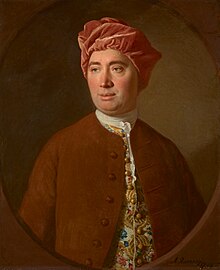
Continuing the line of thought from yesterday and the day before....
So far in this discussion I've quoted Hume only once, that bit from the Enquiry about how "we are ignorant of those powers and forces" etc. So here are a couple of other quotes used by Strawson in laying out his broad thesis. From the Treatise he quotes, "[I am] ready to allow, that there may be several qualities both in material and immaterial objects, with which we are utterly unacquainted."
Note the duality, "material and immaterial." One of Strawson's underlying points is that Hume considered Berkeley's metaphysics a plausible one -- neither certain nor probable, but coherent and on its own terms irrefutable. Berkeley saw the world as consisting of a God, various human minds, and the ideas that God implants into their/our minds. These ideas include the entire sensory world, including the regularities we might describe as examples of causality. Berkeley too, then, believes in a separation between causation lower-case and Causation. In causation, a first sensory event (a) precedes another (b) and we say that a caused b -- the hand that dropped the ball in that action caused the ball to fall to the ground. In the deeper meaning, Causation, the first and second sensory events are both given us/caused/produced by the Divine Mind directly. All reality is immaterial and true Cause likewise.
Hume didn't endorse that view, but he always took it into account. This even shows up in the wording of statements that seem only tangentially related. Consider Philo, Hume's mouthpiece in the Dialogues, arguing against the inference that a supernatural intelligence must have created the world. Philo says there are at least two possibilities, "For aught we can know a priori, matter may contain the source or spring of order originally within itself ... there is no more difficulty in conceiving, that the several elements, from an internal unknown cause, may fall into the most exquisite arrangement, than to conceive that their ideas, in the great, universal mind, from a like internal unknown cause, may fall into that arrangement., The equal possibility of both these suppositions is allowed."
Consider the language in which Philo allows for the theistic supposition. It isn't a matter of God as an architect creating a material world. Rater, it is of God, as the great universal mind, falling into a particular "arrangement" of His own "ideas" which corresponds to the "most exquisite arrangement" in which we find things. That's a rather Berkelayan wording of the possibility of a world with God at its heart.
One common trope in the history of philosophy takes Berkeley, Hume, and Kant as a triptych of epistemological and metaphysical warriors, each setting out to overthrow the one before, to become the new champion. In a sense Strawson takes over this trope. Berkeley and Kant are both referenced quite often in this book centered on Hume. BUT ... Strawson sees their relations differently.
Just as Hume respectfully incorporates the possibility of a Berkeleyan world into his writing, so Hume anticipates Kant's distinction between noumenal and phenomenal worlds. In Strawson's view, these three aren't contending warriors, they are allies, the Three Amigos of philosophy!
And with that happy thought I conclude my discussion of this Christmas gift.
Well, sort of. I'll have some thoughts tomorrow that go beyond Strawson and further into this Three-Amigos conception.
Comments
Post a Comment